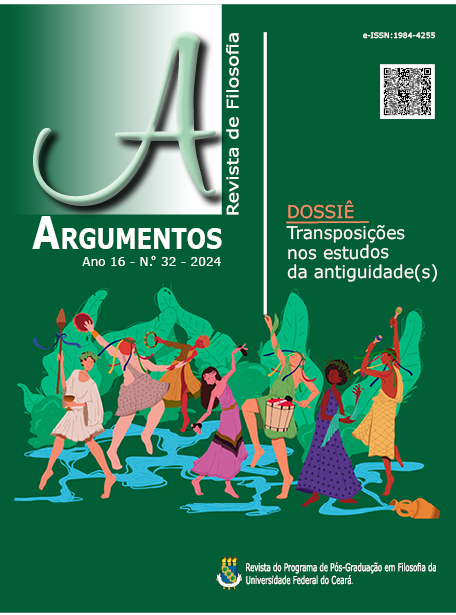The reverse of Socrates: Xanthippe and the place of women in the history of Philosophy
Keywords:
Xanthippe. Socrates. Plato. Gender issues.Abstract
In the history of Philosophy, Socrates is represented as an individual with a firm and temperate character, although intellectually restless, whose investigations inaugurate reflections of a properly ethical nature within the scope of ancient thought. Its historical position is considered so central that he is chosen as the term for the periodization of Ancient Philosophy (with its philosophers currently organized around the curious notion of “pre-Socratics”). His wife, Xanthippe, on the other hand, is represented by ancient biographical tradition as ill-tempered, willful, and intemperate. In several anecdotes, she embodies the opposite of everything expected of a philosopher. In order to reflect on some constructions based on gender aspects within the history of Philosophy, we will analyze the metonymic value that representations of Socrates, Xanthippe and other female figures from his surroundings acquire in philosophical works, especially those composed by Plato.
References
BAKHTINE, M. Problèmes de la poétique de Dostoïevski. Paris: L’Âge d’Homme, 1970.
BICKNELL, P. J. Sokrates’ mistress Xanthippe. Apeiron, v. 8, n. 1, 1974, p. 1-5.
CIORAN, E. Syllogismes de l’amertume. In: CIORAN, E. Œuvres. Paris: Gallimard, 1995. p. 743-813.
DAVID-JOUGNEAU, M. Socrate dissident: Aux sources d’une éthique pour l’individu citoyen. Paris: Solin, Actes Sud, 2010.
FITTON, J. W. “That was no lady, that was…”. Classical Quarterly, v. 20, n. 1, 1970, p. 56-66.
GABIONETA, R. A maiêutica socrática como ‘união’ de teorias no Teeteto. Revista Classica, v. 28, n. 2, 2015, p. 35-45.
GANDT, M. de. Xanthippe, l’anti-logos. Lettres de la société de psychanalyse freudienne, v. 38, n. 2, 2017, p. 45-56.
JOYCE, J. Ulysses. Notes by Don Gifford with Robert J Seidman. Revised and Expanded edition. Berkeley: University of California Press, 1988.
KOFMAN, S. Socrate(s). Paris: Éditions Galilée, 1989.
LABARBE, J. Les compagnes de Socrate. L’Antiquité classique, Tome 67, 1998, p. 5-43.
LAKS, A. Introdução à “filosofia pré-socrática”. Trad. Miriam Campolina Peixoto. São Paulo: Paulus, 2013.
LAKS, A.; MOST, G. W. (Eds.). Early Greek Philosophy. Cambridge: Cambridge University Press, 2016.
LÖNBORG, S. Socrates and Xanthippe. Theoria, v. 15, n. 1-3, 1949, p. 198-204.
MCHARDY, F.; MARSHALL, E. (Eds.). Women’s influence on classical civilization. London; New York: Routledge, 2004.
MCLAUGHLIN, G. The logistics of gender from classical philosophy. In: MCHARDY, F.; MARSHALL, E. (Eds.). Women’s influence on classical civilization. London; New York: Routledge, 2004. p. 7-25.
MOORE, C. Introduction: Socrates’ writing as writings about Socrates. In: MOORE, C. (Ed.). Brill’s Companion to the reception of Socrates. Leiden; Boston: Brill, 2019. p. 1-37.
NIETZSCHE, F. Humano, demasiado humano. Trad. Paulo César de Souza. São Paulo: Companhia das Letras, 2000.
PLATÃO. Diálogos. Vols. III-IV: Protágoras, Górgias, O Banquete, Fedão. Trad. Carlos Alberto Nunes. Belém: Universidade Federal do Pará, 1980.
POMEROY, S. Goddesses, whores, wives and slaves: women in Classical Antiquity. With a New Preface by the Author. New York: Schocken Books, 1995.
ROUTHIER, F. Socrate peut-il être une femme? Chimères. Revue des schizoanalyses, n. 9, 1990, p. 62-94.
SAXONHOUSE, A. W. Xanthippe and philosophy: Who really wins. In: CLEARY, J. J.; GURTLER, G. M. (Eds.). Proceedings of the Boston Area Colloquium in Ancient Philosophy. Leiden: Brill, 1998.
SAXONHOUSE, A. W. Xanthippe: Shrew or Muse. Hypatia, v. 33, n. 4, 2018, p. 610-25.
SENECA. De matrimonio. In: COELHO, L. A. S. R. O matrimónio do Sapiens: estudo e tradução dos fragmentos do De matrimonio de Lúcio Aneu Séneca. Lisboa. 175 p. Dissertação (Mestrado em Estudos Clássicos), Faculdade de Letras da Universidade de Lisboa, Lisboa, 2011. p. 107-142.
SÊNECA. Sobre a ira. Sobre a tranquilidade da alma. Tradução, introdução e notas de José Eduardo Lohner. São Paulo: Penguin Classics; Companhia das Letras, 2014.
SOUZA, J. R. Que mistério tem Diotima. In: CARVALHO, M.; FIGUEIREDO, V. (Orgs.). Filosofia antiga e medieval. São Paulo: ANPOF, 2013. p. 277-294.
SPINELLI, M. Duas mulheres de Atenas: Aspásia, a companheira de Péricles, e Xantipa, a de Sócrates. Hypnos, v. 39, 2017, p. 258-87.
XENOFONTE. Banquete. Apologia de Sócrates. Tradução do grego, introdução e notas de Ana Elias Pinheiro. Campus Viseu: Universidade Católica Portuguesa, 2008.
XENOFONTE. Memoráveis. Tradução do grego, introdução e notas de Ana Elias Pinheiro. Coimbra: Imprensa da Universidade de Coimbra, 2009.
WOODBURY, L. Socrates and the daughter of Aristides. Phoenix, v. 27, n. 1, 1973, p. 7-25.
ZAPPEN, J. The Rebirth of Dialogue: Bakhtin, Socrates, and the Rhetorical Tradition. New York: State University of New York Press, 2004.
Downloads
Published
Issue
Section
License
Argumentos magazine is licensed under an International Creative Commons Attribution License.
The Magazine uses CC BY inclusion
1) The authors retain the copyright granted to the magazine or the right to initial publication, with the work regularly licensed under the Creative Commons Attribution, which allows the sharing of the work with acknowledgment of authorship and initial publication in this magazine.
2) The authors are authorized to contract additional applicable contracts, for non-exclusive distribution of the version of the work published in this journal (for example, publication in the institutional repository or as a chapter of the book), recognition of authorship and initial publication in this journal.
3) Authors are authorized and encourage to publish and distribute their work online (for example, in institutional repositories or on their personal pages) at any time before or during the editorial process, as they can generate productive changes, as well as increase the impact and reference of published work.




.jpg)










._._3.png)
1.jpg)
._._._.png)
